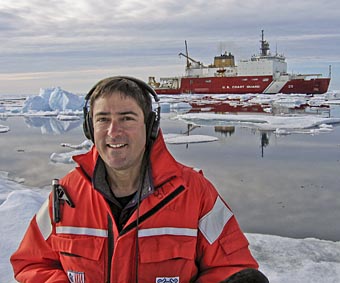Richard Harris has traveled to Timbuktu to witness how climate change is forcing nomadic tribes to give up their wandering lives for a more sedentary existence.
He has climbed the ice-shrouded Mt. Erebus in Antarctica to watch a volcanologist at work and stood beside a charismatic Maasai named Samuel Pilipili as the man administered daily doses of tuberculosis medicine to fellow tribe members in Kenya in an effort to cut the disease's deadly toll.
All of this was done, not for adventure, but to help people learn about scientific discoveries and challenges in our world today.
"I like to tell stories to help people understand what kind of a place we live in and the interesting things scientists are doing," said Harris, an award-winning science correspondent for National Public Radio and a 1980 Crown College graduate. "So many decisions as a society are based on understanding science. To the extent we can understand science more, we can make better decisions."
Curious by nature, the biology major found himself drawn to journalism while taking a science writing course at UCSC from John Wilkes. Reporting satisfied his eclectic interest in science. "Every place I looked interested me," he said.
Harris worked for the San Francisco Examiner before being hired in 1986 at NPR, where stories have taken him from the sides of lake-swallowing holes in Greenland to the eerily empty streets of Beijing during the height of the SARS outbreak.
"What drives me is my own thirst for knowledge," said Harris in a telephone interview from his cubicle in NPR's Washington, D.C., offices. "It's my own desire to find solutions," he said-to help people think about their personal lives on this delicately balanced planet.
Unassuming on the phone, the 51-year-old Harris talks easily about the people he has met but is more reticent about himself, although he admits to being in training for a 100-mile bike ride. He also is looking forward, he said, to doing more stories about how we can shift our lives in the face of climate change and how our oceans are undergoing major alterations, including acidification.
His job, he admitted, has given him a front-row seat on the world. What satisfies him most is taking us along for the ride.
Richard Harris will be a panelist in a discussion on "Shaping Our Environmental Destiny" April 25 as a part of the Alumni Association's Reunion Weekend, April 24-26, 2009.



